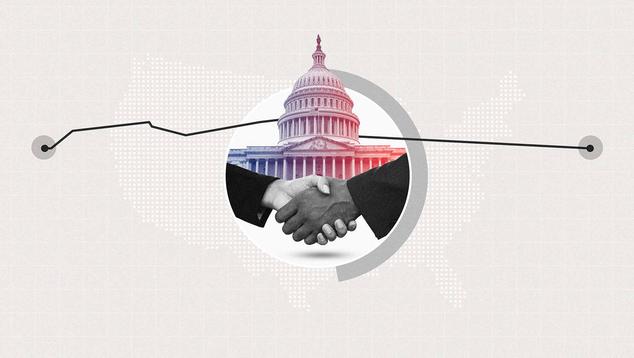Story Highlights
- By 47% to 24%, public favors leaders compromising over sticking to beliefs
- Democrats more likely than Republicans to favor compromise
- Plurality believes own representative digs in rather than compromises
WASHINGTON, D.C. — Continuing their long-standing preference for political cooperation, Americans are twice as likely to say they would rather see leaders in Washington compromise to get things done (47%) than have leaders stick to their political beliefs at the risk of accomplishing little (24%). Another 26% think the best option lies between these choices.
These findings are from a Gallup poll conducted Sept. 2-16, 2025, as Congress faced the recurring challenge of passing a federal spending bill by Oct. 1 to avert a government shutdown.
Gallup first asked this question in November 2010, and the results have varied little over time, with support for compromise ranging from 47% to 54%. The latest result ties the trend low, previously recorded in 2010 and 2011, following Republicans’ House majority win in the 2010 midterms that resulted in divided government under President Barack Obama.
The highest percentage choosing compromise in Gallup's trend, 54%, occurred in 2017 during President Donald Trump’s first year in office as congressional negotiations over immigration policy and the future of DACA were underway, after Trump rescinded the Obama-era policy.
Gallup measures preferences for compromise versus adherence to beliefs using a 1-to-5 scale, where 1 means it is more important for leaders to compromise to get things done and 5 means it’s more important for political leaders to stick to their beliefs, even if little gets done. For this analysis, those who place themselves at a 1 or 2 on the scale are considered to favor compromise, and those who give a response of 4 or 5 are considered to favor sticking to beliefs. Those rating themselves in the midpoint of the scale (a response of 3), labeled for this analysis as “middle ground,” are not considered to have a preference.
Democrats More in Favor of Compromise
As in years past, a majority of Democrats, 58%, prefer leaders compromise, far exceeding the 15% who think leaders should stick to their beliefs and risk inaction. Republicans, on the other hand, are evenly split, with 38% backing each option. Identical 22% shares in each major party prefer something in between.
Many more independents favor compromise (47%) over sticking to beliefs (22%), but 30% do not have a clear preference.
Partisans’ views have largely been consistent over time, although Democrats were more likely to favor compromise in 2011, 2013 and 2014, during the Obama administration. However, majorities have continued to favor compromise in the three readings during Trump’s two presidencies.
Preference for compromise also varies by political ideology, with 58% of moderates, 50% of liberals and 37% of conservatives choosing it. There are no significant differences by education, gender or age.
More Say Own Congressperson Sticks to Beliefs Than Compromises
Separately, the poll asked Americans for the first time to say where their own representative in Congress falls on the spectrum of compromising versus sticking to their beliefs. In contrast to Americans’ general desire for leaders in Washington to compromise, more think their member of Congress tends to stick to their beliefs (40%) than compromise (26%), while 28% rate their representative somewhere in the middle.
These views are similar by party, with 39% of Republicans, 40% of Democrats and 40% of independents saying their own member of Congress generally sticks to their beliefs. At the same time, Democrats (33%) are a bit more likely than Republicans (25%) and independents (24%) to say their member compromises.
Among Americans who would prefer leaders compromise, just 35% believe their own representative does so. Roughly as many (33%) say their representative sticks to their beliefs. By contrast, among those who want to see ideological conviction, 57% believe their representative reflects that approach.
Bottom Line
Americans are generally pragmatic when it comes to how their leaders should perform the nation’s business, with far more preferring that leaders in Washington compromise to ensure things get done than stand on principle with little to show for it.
Given the close division of Democrats and Republicans in Congress in recent years, party leaders must make concessions to win votes both within their caucuses and across the aisle. But nowhere is the struggle to reach consensus more fraught than at budget time, given the supermajority needed in the Senate to pass spending bills.
Although Gallup didn’t ask about the terms of the specific bill being debated, Americans seem philosophically inclined to want to see the two sides work it out and allow government to continue functioning normally, rather than endure a political stalemate that results in widespread disruption to government workers and services.
Stay up to date with the latest insights by following @Gallup on X and on Instagram.
Learn more about how the Gallup Poll Social Series works. View complete question responses and trends (PDF download).




